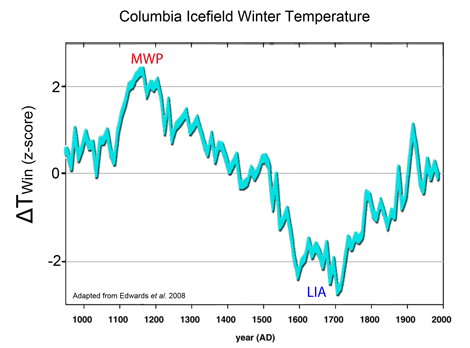Reference
Edwards, T.W.D., Birks, S.J., Luckman, B.H. and MacDonald, G.M. 2008. Climatic and hydrologic variability during the past millennium in the eastern Rocky Mountains and northern Great Plains of western Canada. Quaternary Research 70: 188-197.
What was done
The authors developed a cellulose δ13C dendrochronology "from cross-dated 10-year increments of 16 sub-fossil snags and living-tree ring sequences of Picea engelmannii (Englemann spruce) from upper alpine treeline sites near Athabasca Glacier and subfossil material from the forefield of Robson Glacier plus living and snag material of Pinus albicaulis (whitebark pine) adjacent to Bennington Glacier, spanning AD 951-1990," as well as an oxygen isotope (δ18O) dendrochronology pertaining to the same time period, from pairs of which data they were able to calculate past changes in relative humidity and temperature over Canada's Columbia Icefield in the general vicinity of 53°N, 118°W.
What was learned
Edwards et al. report several "intriguing new discoveries," one of which is "evidence of previously unrecognized winter warmth during the Medieval Climate Anomaly (~AD 1100-1250)," as can be seen in the following figure.

Figure 1. Columbia Icefield mean winter temperature relative to that of the period AD 1941-1990. Adapted from Edwards et al. (2008).
What it means
In viewing the researchers' results, it can be seen that the peak winter temperature of the Medieval Climate Anomaly -- or Medieval Warm Period, as we typically refer to it -- throughout Canada's Columbia Icefield was warmer than the peak temperature of the Current Warm Period (which appears to have occurred ~1915), while it was even warmer than the mean temperature of the 1941-1990 base period, as well as the mean temperature of the last ten years of that period (1980-1990). Hence, it is becoming ever more clear (see our Medieval Warm Period Project ) that recent temperatures around the world have not been "unprecedented" over the past one to two millennia, as climate alarmists typically claim they have.




